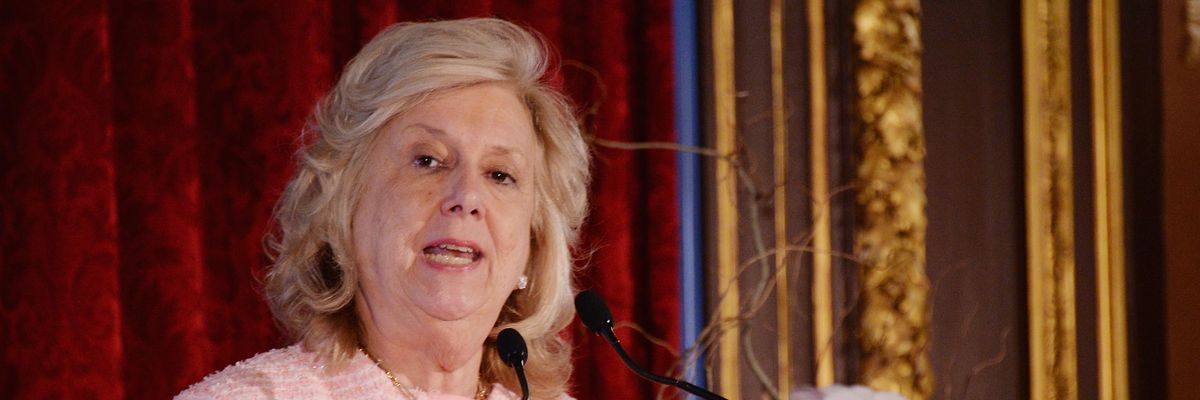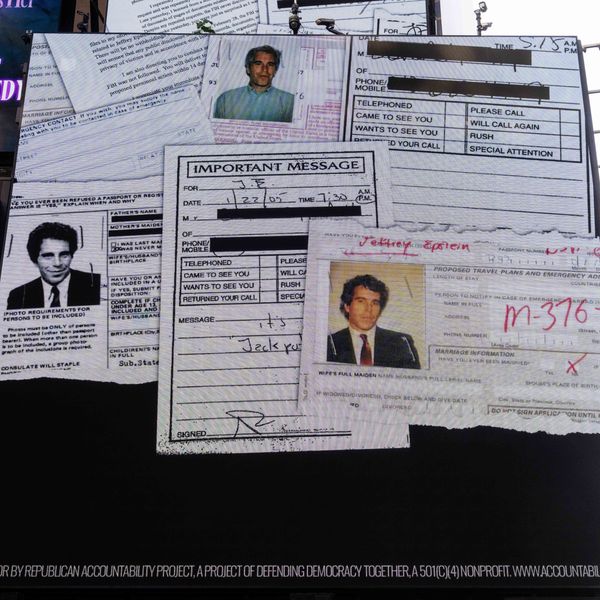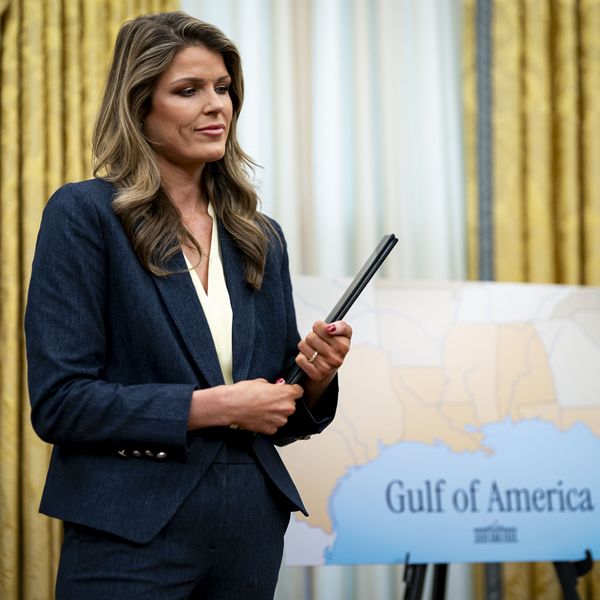
Linda Fairstein
Reopen Linda Fairstein's Cases and Hold New York's Criminal Justice System Accountable
Our criminal justice system is stacked against people of color, especially young people of color, from the moment they come into contact with law enforcement to when they enter probation
Like many of you, I was greatly impacted by Ava Duvernay's essential documentary When They See Us, which premiered on Netflix this week. Ava's film excavates the truth surrounding how five Black and Latino men were wrongly convicted for an attack on a jogger in 1989, resulting in prison sentences that lasted as long as thirteen years. It has sparked a much-needed conversation, popping up in people's everyday lives, in a doctor's office, at the hair salon, around the dinner table.
The significance of this particular case is much broader than the miscarriage of justice that was inflicted on these five men: Kevin Richardson, Antron McCray, Raymond Santana Jr., Korey Wise and Yusef Salaam. We need to know their names, and understand what was done to them, to understand what happens and has happened to millions of black and brown people in America.
The Central Park Five was not an isolated or rare case. This film brings to life the suffering of every black and brown child who's been wrongfully accused, sentenced and put into a facility where they have been exposed to abuse, whether it's been mental, physical or sexual. In When They See Us, we see the ordeal of Kalief Browder, a 16-year old from the Bronx who spent three years on Rikers Island without his case ever coming to trial. Our society should never abandon children like Kalief to the inhuman conditions of prisons like Rikers which are unfit to house adult inmates, let alone wrongly detained teenagers.
In 2017, Justice League NYC, Robert F. Kennedy Human Rights Foundation and numerous community activists got involved to free another Bronx teenager, Pedro Hernandez. In Pedro's case, he had spent more than a year locked up inside Rikers--very nearly missing his opportunity to attend college--until prosecutors finally admitted that they had no case. Oftentimes, people like Pedro and Kalief are prosecuted before they ever step inside a courtroom. When They See Us isn't just about an unhinged prosecutor--it's about how the American criminal justice system brutalizes and imprisons entire generations of young men of color.
So many people who are black and brown and poor have had to face people like Linda Fairstein. These countless unnamed victims of prosecutors like Fairstein don't have a chance. Their guilt is based on who they are, how much money their family has, what color their skin is and what language they speak. They are criminalized for the reality of life for the poor and marginalized, like not having enough money for subway fare, or getting into a fight to defend their family member from abuse.
When I watched When They See Us, I was struck by the vulnerability of the children in the film and asked myself how a prosecutor could not see their basic humanity. Although I don't understand Linda Fairstein's lack of empathy or decency, I do know that it might not even have mattered if she had been motivated by a desire to do the right thing. As a former probation officer, I know that even the people who intend to help and make change end up stuck in a position where they find themselves just pushing paper.
The role of a probation officer is to help individuals meet their probation terms and set goals, like obtaining employment. But I know firsthand that people in my position are then given an overwhelming number of cases and far too few resources with which to help the people who make up our caseload. The result is people being sent back to jail simply for failing to get a job, which is difficult with a record, and the probation officers that failed them not being held accountable. Our criminal justice system is stacked against people of color, especially young people of color, from the moment they come into contact with law enforcement to when they enter probation.
We must reopen Linda Fairstein's old cases, which is the goal of the #CancelLindaFairstein campaign started by my team of activists at The Gathering for Justice and Justice League NYC. We must hold her accountable to any bias that showed up in other cases. But we also have to spend meaningful energy on holding the system accountable, because the problem is certainly much bigger. The system is set up to incentivize incarceration.
Our society needs to commit to funding new approaches to both juvenile and adult justice. When cities and counties have implemented successful programs that reduce incarceration by creating alternatives, those systems ultimately lose funding because we choose as a society to focus on throwing money at the failed prison institutions that are overcrowded, unstable, have high rates of recidivism.
There are examples of successful alternative systems, like the Juvenile Detention Alternatives Initiative in Santa Cruz County, California. To honor the suffering of the Central Park Five, and to tip the scales of justice in the right direction after Linda Fairstein's crimes, we must fund these alternative approaches. Just imagine if we passed a federal mandate for every jurisdiction to implement alternative programs that ultimately reduce the prison population. We should no longer support the systematically racist systems that continue to fail and funnel our families through those systems.
An Urgent Message From Our Co-Founder
Dear Common Dreams reader, The U.S. is on a fast track to authoritarianism like nothing I've ever seen. Meanwhile, corporate news outlets are utterly capitulating to Trump, twisting their coverage to avoid drawing his ire while lining up to stuff cash in his pockets. That's why I believe that Common Dreams is doing the best and most consequential reporting that we've ever done. Our small but mighty team is a progressive reporting powerhouse, covering the news every day that the corporate media never will. Our mission has always been simple: To inform. To inspire. And to ignite change for the common good. Now here's the key piece that I want all our readers to understand: None of this would be possible without your financial support. That's not just some fundraising cliche. It's the absolute and literal truth. We don't accept corporate advertising and never will. We don't have a paywall because we don't think people should be blocked from critical news based on their ability to pay. Everything we do is funded by the donations of readers like you. Will you donate now to help power the nonprofit, independent reporting of Common Dreams? Thank you for being a vital member of our community. Together, we can keep independent journalism alive when it’s needed most. - Craig Brown, Co-founder |
Like many of you, I was greatly impacted by Ava Duvernay's essential documentary When They See Us, which premiered on Netflix this week. Ava's film excavates the truth surrounding how five Black and Latino men were wrongly convicted for an attack on a jogger in 1989, resulting in prison sentences that lasted as long as thirteen years. It has sparked a much-needed conversation, popping up in people's everyday lives, in a doctor's office, at the hair salon, around the dinner table.
The significance of this particular case is much broader than the miscarriage of justice that was inflicted on these five men: Kevin Richardson, Antron McCray, Raymond Santana Jr., Korey Wise and Yusef Salaam. We need to know their names, and understand what was done to them, to understand what happens and has happened to millions of black and brown people in America.
The Central Park Five was not an isolated or rare case. This film brings to life the suffering of every black and brown child who's been wrongfully accused, sentenced and put into a facility where they have been exposed to abuse, whether it's been mental, physical or sexual. In When They See Us, we see the ordeal of Kalief Browder, a 16-year old from the Bronx who spent three years on Rikers Island without his case ever coming to trial. Our society should never abandon children like Kalief to the inhuman conditions of prisons like Rikers which are unfit to house adult inmates, let alone wrongly detained teenagers.
In 2017, Justice League NYC, Robert F. Kennedy Human Rights Foundation and numerous community activists got involved to free another Bronx teenager, Pedro Hernandez. In Pedro's case, he had spent more than a year locked up inside Rikers--very nearly missing his opportunity to attend college--until prosecutors finally admitted that they had no case. Oftentimes, people like Pedro and Kalief are prosecuted before they ever step inside a courtroom. When They See Us isn't just about an unhinged prosecutor--it's about how the American criminal justice system brutalizes and imprisons entire generations of young men of color.
So many people who are black and brown and poor have had to face people like Linda Fairstein. These countless unnamed victims of prosecutors like Fairstein don't have a chance. Their guilt is based on who they are, how much money their family has, what color their skin is and what language they speak. They are criminalized for the reality of life for the poor and marginalized, like not having enough money for subway fare, or getting into a fight to defend their family member from abuse.
When I watched When They See Us, I was struck by the vulnerability of the children in the film and asked myself how a prosecutor could not see their basic humanity. Although I don't understand Linda Fairstein's lack of empathy or decency, I do know that it might not even have mattered if she had been motivated by a desire to do the right thing. As a former probation officer, I know that even the people who intend to help and make change end up stuck in a position where they find themselves just pushing paper.
The role of a probation officer is to help individuals meet their probation terms and set goals, like obtaining employment. But I know firsthand that people in my position are then given an overwhelming number of cases and far too few resources with which to help the people who make up our caseload. The result is people being sent back to jail simply for failing to get a job, which is difficult with a record, and the probation officers that failed them not being held accountable. Our criminal justice system is stacked against people of color, especially young people of color, from the moment they come into contact with law enforcement to when they enter probation.
We must reopen Linda Fairstein's old cases, which is the goal of the #CancelLindaFairstein campaign started by my team of activists at The Gathering for Justice and Justice League NYC. We must hold her accountable to any bias that showed up in other cases. But we also have to spend meaningful energy on holding the system accountable, because the problem is certainly much bigger. The system is set up to incentivize incarceration.
Our society needs to commit to funding new approaches to both juvenile and adult justice. When cities and counties have implemented successful programs that reduce incarceration by creating alternatives, those systems ultimately lose funding because we choose as a society to focus on throwing money at the failed prison institutions that are overcrowded, unstable, have high rates of recidivism.
There are examples of successful alternative systems, like the Juvenile Detention Alternatives Initiative in Santa Cruz County, California. To honor the suffering of the Central Park Five, and to tip the scales of justice in the right direction after Linda Fairstein's crimes, we must fund these alternative approaches. Just imagine if we passed a federal mandate for every jurisdiction to implement alternative programs that ultimately reduce the prison population. We should no longer support the systematically racist systems that continue to fail and funnel our families through those systems.
Like many of you, I was greatly impacted by Ava Duvernay's essential documentary When They See Us, which premiered on Netflix this week. Ava's film excavates the truth surrounding how five Black and Latino men were wrongly convicted for an attack on a jogger in 1989, resulting in prison sentences that lasted as long as thirteen years. It has sparked a much-needed conversation, popping up in people's everyday lives, in a doctor's office, at the hair salon, around the dinner table.
The significance of this particular case is much broader than the miscarriage of justice that was inflicted on these five men: Kevin Richardson, Antron McCray, Raymond Santana Jr., Korey Wise and Yusef Salaam. We need to know their names, and understand what was done to them, to understand what happens and has happened to millions of black and brown people in America.
The Central Park Five was not an isolated or rare case. This film brings to life the suffering of every black and brown child who's been wrongfully accused, sentenced and put into a facility where they have been exposed to abuse, whether it's been mental, physical or sexual. In When They See Us, we see the ordeal of Kalief Browder, a 16-year old from the Bronx who spent three years on Rikers Island without his case ever coming to trial. Our society should never abandon children like Kalief to the inhuman conditions of prisons like Rikers which are unfit to house adult inmates, let alone wrongly detained teenagers.
In 2017, Justice League NYC, Robert F. Kennedy Human Rights Foundation and numerous community activists got involved to free another Bronx teenager, Pedro Hernandez. In Pedro's case, he had spent more than a year locked up inside Rikers--very nearly missing his opportunity to attend college--until prosecutors finally admitted that they had no case. Oftentimes, people like Pedro and Kalief are prosecuted before they ever step inside a courtroom. When They See Us isn't just about an unhinged prosecutor--it's about how the American criminal justice system brutalizes and imprisons entire generations of young men of color.
So many people who are black and brown and poor have had to face people like Linda Fairstein. These countless unnamed victims of prosecutors like Fairstein don't have a chance. Their guilt is based on who they are, how much money their family has, what color their skin is and what language they speak. They are criminalized for the reality of life for the poor and marginalized, like not having enough money for subway fare, or getting into a fight to defend their family member from abuse.
When I watched When They See Us, I was struck by the vulnerability of the children in the film and asked myself how a prosecutor could not see their basic humanity. Although I don't understand Linda Fairstein's lack of empathy or decency, I do know that it might not even have mattered if she had been motivated by a desire to do the right thing. As a former probation officer, I know that even the people who intend to help and make change end up stuck in a position where they find themselves just pushing paper.
The role of a probation officer is to help individuals meet their probation terms and set goals, like obtaining employment. But I know firsthand that people in my position are then given an overwhelming number of cases and far too few resources with which to help the people who make up our caseload. The result is people being sent back to jail simply for failing to get a job, which is difficult with a record, and the probation officers that failed them not being held accountable. Our criminal justice system is stacked against people of color, especially young people of color, from the moment they come into contact with law enforcement to when they enter probation.
We must reopen Linda Fairstein's old cases, which is the goal of the #CancelLindaFairstein campaign started by my team of activists at The Gathering for Justice and Justice League NYC. We must hold her accountable to any bias that showed up in other cases. But we also have to spend meaningful energy on holding the system accountable, because the problem is certainly much bigger. The system is set up to incentivize incarceration.
Our society needs to commit to funding new approaches to both juvenile and adult justice. When cities and counties have implemented successful programs that reduce incarceration by creating alternatives, those systems ultimately lose funding because we choose as a society to focus on throwing money at the failed prison institutions that are overcrowded, unstable, have high rates of recidivism.
There are examples of successful alternative systems, like the Juvenile Detention Alternatives Initiative in Santa Cruz County, California. To honor the suffering of the Central Park Five, and to tip the scales of justice in the right direction after Linda Fairstein's crimes, we must fund these alternative approaches. Just imagine if we passed a federal mandate for every jurisdiction to implement alternative programs that ultimately reduce the prison population. We should no longer support the systematically racist systems that continue to fail and funnel our families through those systems.

